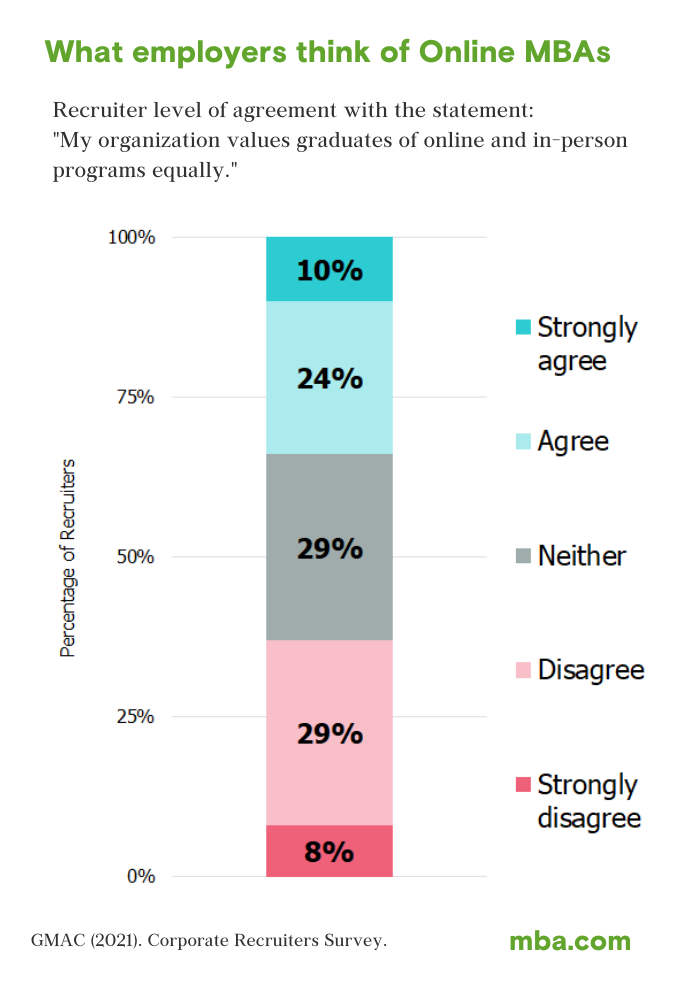In the contemporary digital landscape, the proliferation of online education platforms has revolutionized the traditional mode of acquiring higher degrees.
Among the myriad of programs offered online, Master of Business Administration (MBA) has garnered significant attention for its convenience and accessibility. However, a lingering question persists: Are online MBA programs as effective as their offline counterparts?
This article delves into this crucial inquiry, exploring the pedagogical methodologies, learning outcomes, career prospects, and overall efficacy of online MBA programs compared to their traditional classroom-based counterparts.
The Value Proposition of Online vs. Offline MBA Programs
Flexibility and Accessibility
Online MBA programs offer unparalleled flexibility and accessibility. Students can study from anywhere in the world at their own pace, making it a perfect choice for working professionals or individuals with family commitments. They can access course materials and engage in discussions at any time that suits them, allowing for a more personalized learning experience.
| Online MBA | Offline MBA |
|---|---|
| High flexibility | Limited flexibility |
| Accessible from anywhere | Requires physical presence |
| Self-paced learning | Structured schedule |
Quality of Education
While online programs are increasingly gaining recognition, the quality of education remains a concern for some. However, top-tier online MBA programs are often comparable to their offline counterparts. They offer rigorous curriculums, experienced faculty, and access to the same resources, ensuring a similar standard of learning.
| Online MBA | Offline MBA |
|---|---|
| Rigorous curriculum | Rigorous curriculum |
| Experienced faculty | Experienced faculty |
| Access to online resources | Access to physical resources |
Networking and Career Advancement
Networking opportunities can be perceived as a drawback of online MBA programs. While offline programs provide in-person interaction and events, online programs offer alternative methods for building connections. Students can participate in online forums, attend virtual events, and leverage alumni networks to build professional relationships.
| Online MBA | Offline MBA |
|---|---|
| Online forums and events | In-person networking events |
| Virtual alumni networks | Strong alumni communities |
| Focus on building online connections | Emphasis on building in-person relationships |
Is an online MBA taken seriously?

Is an Online MBA Taken Seriously by Employers?
Whether or not an online MBA is taken seriously by employers depends on several factors, including the reputation of the institution, the program’s curriculum, and the individual student’s experience and accomplishments. However, online MBA programs are becoming increasingly recognized and respected, as they offer a convenient and flexible way to earn a high-quality business education.
- Accreditation: Accreditation by reputable organizations like AACSB (Association to Advance Collegiate Schools of Business) or EQUIS (European Quality Improvement System) is a strong indicator of program quality and can help employers take the degree seriously. Accreditation ensures that the program meets rigorous academic standards and prepares graduates for success in the business world.
- Reputation of the Institution: The reputation of the university offering the online MBA program is another important factor. Employers are more likely to take the degree seriously if it is from a highly-ranked and well-regarded institution.
- Curriculum and Faculty: The curriculum and faculty of the online MBA program are also important considerations. Employers are looking for programs that offer a rigorous and relevant curriculum, taught by experienced and qualified faculty. The program should cover key business topics, such as finance, marketing, strategy, and operations, and provide students with practical skills and knowledge that can be applied in the workplace.
Do Online MBA Graduates Have the Same Career Opportunities as Traditional MBA Graduates?
Online MBA graduates have access to many of the same career opportunities as traditional MBA graduates. The key is to choose a program that is accredited and offered by a reputable institution, and to focus on developing the skills and knowledge that are valued by employers. An online MBA can be just as valuable as a traditional MBA for career advancement and salary potential, but it’s important to remember that success depends on the individual and their commitment to the program.
- Networking Opportunities: Online MBA programs often offer opportunities for students to connect with peers and faculty through online forums, group projects, and virtual networking events. These connections can be valuable for building a professional network and exploring career opportunities.
- Flexibility and Affordability: Online MBA programs offer flexibility, allowing students to continue working while pursuing their degree. This flexibility can be a significant advantage for working professionals who may not have the time or resources to pursue a traditional MBA program.
- Increasing Demand for Online Degrees: The demand for online degrees is growing, as more employers recognize the value of online education. As the perception of online degrees continues to evolve, online MBA graduates are likely to have even more career opportunities in the future.
What Are the Disadvantages of an Online MBA?
While online MBA programs offer significant benefits, there are also some potential disadvantages to consider. For example, online learning can be isolating, and students may lack the opportunity for face-to-face interaction with faculty and peers. Online MBA programs also require strong self-discipline and time management skills, as students must be able to manage their workload effectively while balancing other responsibilities.
- Lack of Face-to-Face Interaction: While online learning platforms are becoming more sophisticated, there are still limitations to the level of interaction and collaboration that can be achieved online. For some students, this can lead to a feeling of isolation and a lack of personal connection with classmates and faculty.
- Requires Strong Self-Discipline and Time Management: Online MBA programs require students to be highly organized and self-motivated to succeed. Students must be able to manage their time effectively, set aside dedicated time for studying, and stay on track with their coursework.
- Potential for Distractions: Online learning can be challenging for students who struggle to focus in a home environment. There are many distractions that can interfere with studying, such as family obligations, work responsibilities, and social media.
Do companies care if your MBA was online?

Does an online MBA hold the same value as a traditional one?
While some companies may still hold traditional MBA programs in higher regard, the value of an online MBA is rapidly growing. Many companies recognize that online MBAs offer the same rigor and curriculum as traditional programs, with the added benefit of flexibility and affordability. The online learning environment has matured significantly, and reputable institutions have invested heavily in delivering high-quality online MBA experiences.
Factors that influence company perception of online MBAs
- The reputation of the school: Companies will often prioritize schools with strong reputations, regardless of delivery method.
- The specific role and company culture: Some companies may prioritize candidates with traditional MBAs for certain roles, while others may embrace online education as a sign of initiative and adaptability.
- Your individual accomplishments and experience: Your work history, skills, and achievements will always play a significant role in securing a job, regardless of the type of MBA you hold.
Tips for making your online MBA stand out
- Highlight your achievements and projects in your online program: Showcase your online learning experience by emphasizing projects, skills, and experiences gained through your online MBA program.
- Network with classmates and professionals: Leverage online networking opportunities to build connections and gain insights into the industry.
- Consider an internship or professional development program: Gaining practical experience and industry insights can enhance your profile and demonstrate your commitment to the field.
Is it better to do an MBA online or in-person?

Choosing the right format for your MBA
The decision of whether to pursue an MBA online or in-person depends heavily on your individual circumstances and priorities. Both formats offer distinct advantages and disadvantages, and it’s crucial to carefully weigh them to determine the best fit for your goals and lifestyle.
Advantages of an Online MBA
- Flexibility and Convenience: Online MBAs offer unparalleled flexibility, allowing you to study at your own pace and on your own schedule. This is particularly beneficial for working professionals or individuals with family commitments who may find it challenging to attend traditional classes. You can access course materials and lectures from anywhere with an internet connection, making it convenient to fit your studies around your existing responsibilities.
- Cost-Effectiveness: Online MBAs can often be significantly more affordable than their in-person counterparts. This is due to lower overhead costs associated with running online programs, such as physical infrastructure and faculty salaries. You can also save on expenses related to relocation, commuting, and housing, making an online MBA a financially attractive option.
- Wider Range of Programs: The online learning landscape offers a broader selection of MBA programs compared to traditional universities. You can explore programs from various institutions across the globe, widening your options and increasing your chances of finding a program that aligns with your career aspirations.
Advantages of an In-Person MBA
- Networking Opportunities: In-person MBA programs provide ample opportunities for networking with fellow students, faculty, and industry professionals. Building relationships with classmates can be invaluable for career advancement, job searching, and professional development. The close-knit community fostered in traditional programs can also lead to lifelong friendships and support systems.
- Immersive Learning Environment: In-person classes offer an immersive learning environment that fosters collaboration and interaction. You can engage in real-time discussions with professors and classmates, participate in group projects, and receive immediate feedback on your work. This hands-on approach can enhance your understanding of the material and deepen your learning experience.
- Stronger Brand Recognition: Some top-tier business schools may hold more prestige and brand recognition for their in-person MBA programs than for their online counterparts. This can be a valuable asset for your career, particularly if you are aiming for leadership positions in highly competitive industries.
How difficult is an online MBA program?

Time Commitment
An online MBA program requires a significant time commitment. You’ll need to carve out time each week for coursework, assignments, and group projects. While you can complete your coursework on your own schedule, you’ll need to be disciplined and dedicated to making time for your studies, even if it means sacrificing other activities.
- Coursework: You’ll need to complete a substantial amount of coursework, including lectures, readings, quizzes, and assignments.
- Assignments: You’ll need to complete a variety of assignments, including case studies, essays, and presentations.
- Group Projects: You’ll need to work collaboratively with other students on group projects. This can be challenging, especially if you have different time zones or communication styles.
Rigorous Curriculum
An online MBA program is just as rigorous as a traditional on-campus MBA program. You’ll be expected to have a strong understanding of business principles and be able to apply them to real-world situations.
- Business Fundamentals: You’ll need to have a strong understanding of business fundamentals, such as accounting, finance, marketing, and management.
- Critical Thinking: You’ll need to be able to think critically and solve complex business problems.
- Analytical Skills: You’ll need to be able to analyze data and draw conclusions.
Technological Challenges
Online MBA programs rely heavily on technology. You’ll need to be comfortable using various software programs and online platforms. If you’re not tech-savvy, you might find yourself struggling to keep up with the demands of the program.
- Technical Skills: You’ll need to be comfortable using online platforms and software, including video conferencing, learning management systems, and online collaboration tools.
- Internet Access: You’ll need reliable internet access to participate in live classes, submit assignments, and access course materials.
- Technology Troubleshooting: You’ll need to be able to troubleshoot any technical issues that arise. This could include things like software updates, internet connectivity problems, or device malfunctions.
Frequently Asked Questions
Is an online MBA as effective as an on-campus MBA?
While there are some key differences between online and traditional MBA programs, online MBA programs can be just as effective as on-campus programs. In fact, many online MBA programs offer the same quality of education as their on-campus counterparts, with the added benefit of flexibility and affordability. Online MBA programs are often taught by the same faculty as their on-campus counterparts, and they offer a comprehensive curriculum covering all the core business principles.
What are the benefits of an online MBA program?
Online MBA programs offer a number of benefits over traditional programs, including:
Flexibility: Online programs allow students to learn at their own pace and on their own schedule. This is particularly beneficial for working professionals who are unable to attend traditional on-campus classes.
Affordability: Online MBA programs are often more affordable than traditional programs, due to lower overhead costs.
Accessibility: Online MBA programs are accessible to students from all over the world.
Technology: Online MBA programs often use cutting-edge technology to enhance the learning experience. This can include interactive simulations, online forums, and virtual classrooms.
What are the drawbacks of an online MBA program?
There are a few potential drawbacks to consider when choosing an online MBA program:
Lack of in-person interaction: Online MBA programs may lack the in-person interaction that is common in traditional programs. This can make it more difficult to build relationships with classmates and professors.
Discipline and self-motivation: Online learners need to be highly disciplined and self-motivated to succeed in an online program. This is because they are responsible for managing their own time and staying on track with their studies.
Technology: Online MBA programs rely heavily on technology, so students need to ensure that they have access to a reliable internet connection and a suitable computer.
How can I choose the right online MBA program for me?
Choosing the right online MBA program is an important decision. Here are some factors to consider:
Accreditation: Ensure that the program is accredited by a reputable body, such as AACSB or EQUIS.
Curriculum: Review the program’s curriculum to ensure that it covers the areas of business that are most relevant to your career goals.
Faculty: Research the program’s faculty to ensure that they have the experience and expertise that you are looking for.
Reputation: Consider the program’s reputation in the industry.
Cost: Compare the cost of different programs to find the best value for your money.
Flexibility: Choose a program that offers the flexibility you need to balance your studies with your work and personal life.



